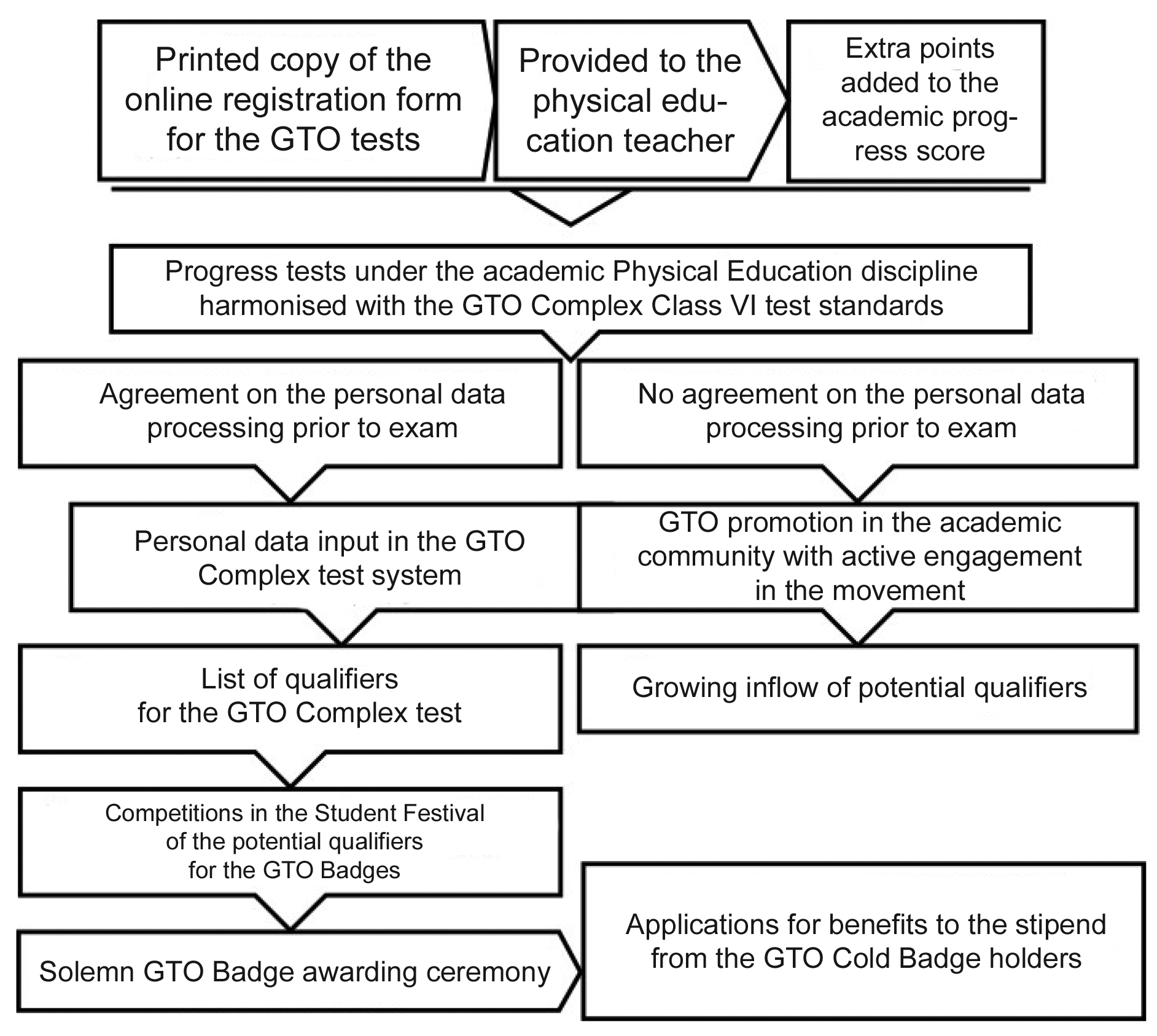GTO complex implementation experience and prospects at Ural Federal University
Фотографии:
ˑ:
A.V. Korobova1
N.B. Serova1
E.G. Shurmanov1
L.N. Fitina2
1Ural Federal University named after the first President of Russia B.N. Yeltsin, Yekaterinburg
2Yekaterinburg City Administration, Yekaterinburg
Keywords: Russian Physical Culture and Sports ‘Ready for Labour and Defence’ (GTO) Complex, GTO Complex Test Centre, Ural Federal University, promising operation model.
Background. With new sport disciplines emerging and gaining popularity for the last few years, a growing priority has been given to the young people physical activation initiatives to counter the concerning trends in the university students’ health sagging statistics. The economic and political challenges faced by our country have had certain destabilizing implications for the young population that is increasingly vulnerable to drug- and alcohol-addiction, smoking, HIV etc.
Prominent national sociologist I.S. Kon makes a special emphasis on the socializing aspect of the university age that he refers to as the ‘second maturity period’ when the personality traits are formed [1]. Young people of this sensitive age group are in need of special support from the government with due priority to the modern physical education and sports tools to facilitate their health improvement and harmonious patriotic personality development process.
For the above policy goals being attained, Russian President V.V. Putin signed (in 2014) the GTO Complex reinstatement decree intended to engage the national population on the whole and academic youth in particular in the mass sport movement [3]. As provided by the Physical Culture and Sports Development Strategy of the Russian Federation for the period up to 2010 and the National Physical Culture and Sports Development Program of the Russian Federation, the share of total population and student population engaged in habitual physical culture and sports shall come to 40% and 80%, respectively, by the year of 2020 [2].
Objective of the study was to provide a theoretical foundation for and test benefits of the GTO Complex test model implemented at Ural Federal University (UrFU).
Methods and structure of the study. It was in November 2016 that Ural Federal University formally registered its own GTO Complex Test Centre with the mission of sports promotion and progress rating tests. The initiative was facilitated by an effective cooperation of the Sport Club of UrFU and the Institute of Physical Culture, Sports and Youth Policies that resulted in the GTO Complex project success both in the academic environment and local communities of Yekaterinburg city. The success is verified by the statistics reported by the GTO Complex Test Centre including the numbers of test events, qualifiers for and winners of the tests awarded by GTO Badges.
The UrFU success in the GTO Complex implementation project may be explained by the proactive approach of the University in its role of the Russian academic sports leader, since the university management took urgent actions – as soon as the message on the GTO Complex reinstatement initiative was received from the federal authorities – to restore and develop the relevant assets and facilities for the mass qualification tests, accumulate the project experience and recruit professional human resource for success of the project.
Study results and discussion, UrFU is the first Russian university that put on track the mass GTO Complex tests in May 2015 under the “Vesna Pobedy” (English: Spring of Victory) Patriotic Festival on the 70th anniversary of victory in the Great Patriotic War. The event was designed to duly inform the students on the valid federal requirements to the age-specific physical fitness, cultivate positive attitudes to the reinstated GTO Complex tests and encourage them for the qualification trainings and tests viewed as a tool to encourage habitual physical trainings and sports (forming a basis for success in the tests) rather than an occasional sport event.
The event was reported to have the following results: 2930 people in total qualified for the event, including 267, 119 and 33 people awarded with the GTO Bronze, Silver and Gold Badges, respectively. The event made it possible to procure all the required sport assets and equipment for the GTO Complex tests and pilot the mass test model.
Since February 2017, the certified GTO Complex Test Centre has been active in encouraging the academic and local communities for qualifications for the GTO Complex tests, with a special emphasis on promotion of the GTO Complex tests in a variety of formats of special interest for the young people. To give examples of the successful GTO promotion projects, we would mention the GTO Complex test promotion stations under the “Nedelya muzhestva” (English: Week of Courage) Sport Festival on July 05, 2017 on the Drama Theatre Square; and “Day of Yekaterinburg” on August 19, 2017 on the Labour Square; with every willing resident of the city offered a chance to check own fitness for the GTO Complex tests and formally pass the tests versus the relevant standards. The GTO Complex test promotion stations under the events made a special emphasis in their operations on the public awareness on the services provided by the GTO Complex test promotion stations and GTO Complex Test Centre in Yekaterinburg, test procedures and qualifications with due motivations including lotteries of unique identification numbers for the GTO Complex test qualifiers. The GTO Complex test promotion stations reported to serve more than 500 people dominated by children and youth.
One more field for activity is the formal GTO qualifier events designed to compose the local GTO teams for the higher-level sport events. The GTO Complex Test Centre gives a high priority in its operations to a variety of modern services including: the exemplary test execution videos; individualised logistics for the qualifications and test stages to speed up the test process; recreation services; interactive entertainments etc. For the relatively short period of its operation, the GTO Complex Test Centre tested a few operational formats. At first it tried the Sport Festival format plus the all-round GTO Complex tests under the regular academic all-round sport programs. This model is considered a point format that cannot be applied to serve large numbers of qualifiers. One more model is the scheduled test format with the tests scheduled in the off-class time in the academic sport facilities. This format, however, was found totally cost-inefficient since the human, institutional and financial resource claimed by the format was too high versus the inflow of qualifiers. Our analysis of the GTO Complex Test Centre operations made it possible to find the most promising aspects and development options to design the most efficient operational model.
It was the difficult qualifier registration procedure including online registration on gto.ru website that was found the key barrier for the students’ engagement in the events and demand for the GTO Complex Test Centre services. The Centre has taken efforts to remove this barrier by providing additional motivations including interactive competitions timed to the sport events with wins of unique GTO identification numbers; and extra points added to the academic progress scores under the academic Physical Education curriculum conditional on the registration form being filled in on the GTO website.
One more bottleneck was the inconvenient schedule of the Centre operations and shortage of free time reported by the students. We decided to analyse the list of progress test rates under the academic Physical Education curriculum and found these test standards being largely correspondent to the relevant GTO Complex Class VI test standards. Therefore, we offered changes to the optional part of the academic Physical Education curriculum to design a promising model of the GTO Complex Test Centre services with their due integration in the academic curriculum so as to have the progress test standards under the academic Physical Education curriculum duly harmonised with the GTO Complex Class VI test standards.
Given on Figure 1 hereunder is the step-by-step operation procedure of the new promising model of the GTO Complex Test Centre services, with the both above sets of motivations found quite effective and beneficial.

Figure 1. Operation procedure of the new promising model of the GTO Complex Test Centre services
At the first stage of the proposed model implementation, the process was supported by a special education curriculum “GTO Complex test procedure for education establishments” scheduled for implementation in November 2017. Under this curriculum, every teacher will have the right to register progress test rates under the academic Physical Education curriculum in close cooperation with the GTO Complex Test Centre to secure the test process being harmonised.
This model of the GTO Complex Test Centre operations, as opposed to the other service formats, makes it possible to cut down the process costs; increase the inflow of formally registered and freely joining qualifiers and winners of one or another GTO Complex badge; offer encouraging conditions for the students’ trainings and qualifications for the tests; and remove the duplication of responsibilities of the physical education specialists and the GTO Complex Test Centre personnel thereby making the process highly efficient.
Conclusion. The study data and analysis gave the means to: simplify the registration procedure at the GTO Complex Test Centre; offer convenient online mass registration at gto.ru website for students; make improvements to the optional part of the academic Physical Education curriculum; and advance knowledge and skills of the physical education specialists of the Institute of Physical Culture, Sports and Youth Policies. The proposed new promising model of the GTO Complex Test Centre under UrFU was found highly beneficial.
References
- Kon I.S. Sotsiologicheskaya psikhologiya [Sociological Psychology]. Voronezh: MODEK publ., 1999, 560 p.
- Postanovlenie Pravitelstva Rossiyskoy Federatsii ot 21 yanvarya 2015 g. no. 30 «O Federalnoy tselevoy programme «Razvitie fizicheskoy kultury i sporta v Rossiyskoy Federatsii na 2016–2020 gody» [Decree of the Government of the Russian Federation January 21, 2015 no. 30 "On the Federal Target Program" Development of Physical Culture and Sports in the Russian Federation for 2016-2020"].
- Ukaz Prezidenta RF ot 24 marta 2014 goda no. 172 "O Vserossiyskom fizkulturno-sportivnom komplekse "Gotov k trudu i oborone" (GTO)" [Decree of the President of the Russian Federation March 24, 2014 no. 172 "About Russian physical culture and sports complex" Ready for work and defense "(GTO)"]. Rossiyskaya gazeta. 26.03.2014. no. 68.
Corresponding author: avkorobova@mail.ru
Abstract
The study overviews practical experience of the GTO Complex implementation at Ural Federal University (UrFU) since the GTO Complex reinstatement by the Federal government; analyses the GTO Complex Test Centre operations at UrFU with the process successes and drawbacks; makes a special emphasis on the GTO Complex implementation specifics in the academic environments; and offers practical instruments for the GTO Complex promotion in the modern student communities. Our analysis of the GTO Complex Test Centre operation models made it possible to offer a unique promising model for the GTO Complex implementation at Ural Federal University as described in the article. The model is based on the idea of the GTO Complex tests integration with the academic Physical Education curriculum. The proposed new model offers effective tools for the model promotion in the student environments with the most comfortable and encouraging conditions for the tests; with due respect to voluntariness as the key principle of the GTO Complex; and with modest revisions of the variable component of the academic Physical Education curriculum designed to develop the five key physical qualities: speed, strength, flexibility, dexterity and endurance. The article makes a preliminary analysis of benefits of the new model in the institutional and economic domains.



 Журнал "THEORY AND PRACTICE
Журнал "THEORY AND PRACTICE